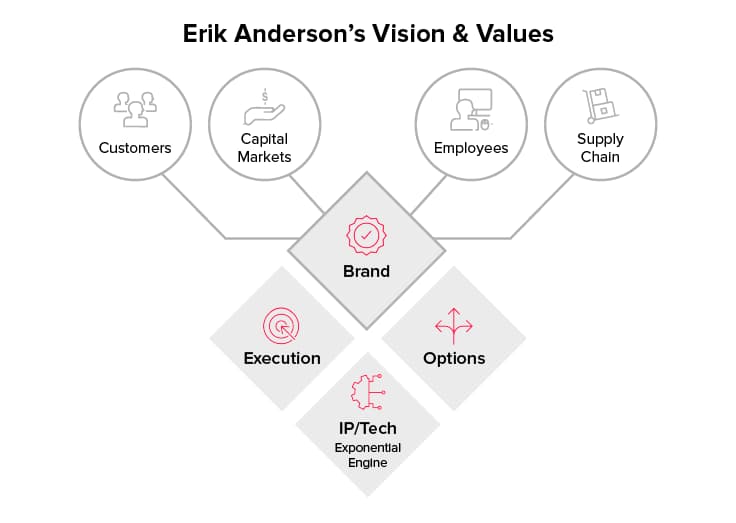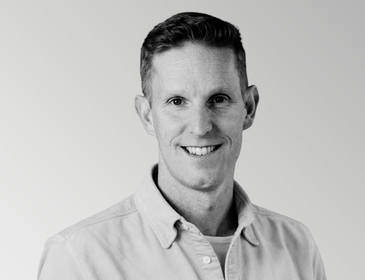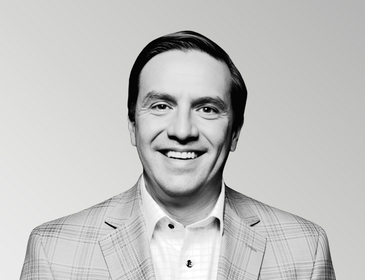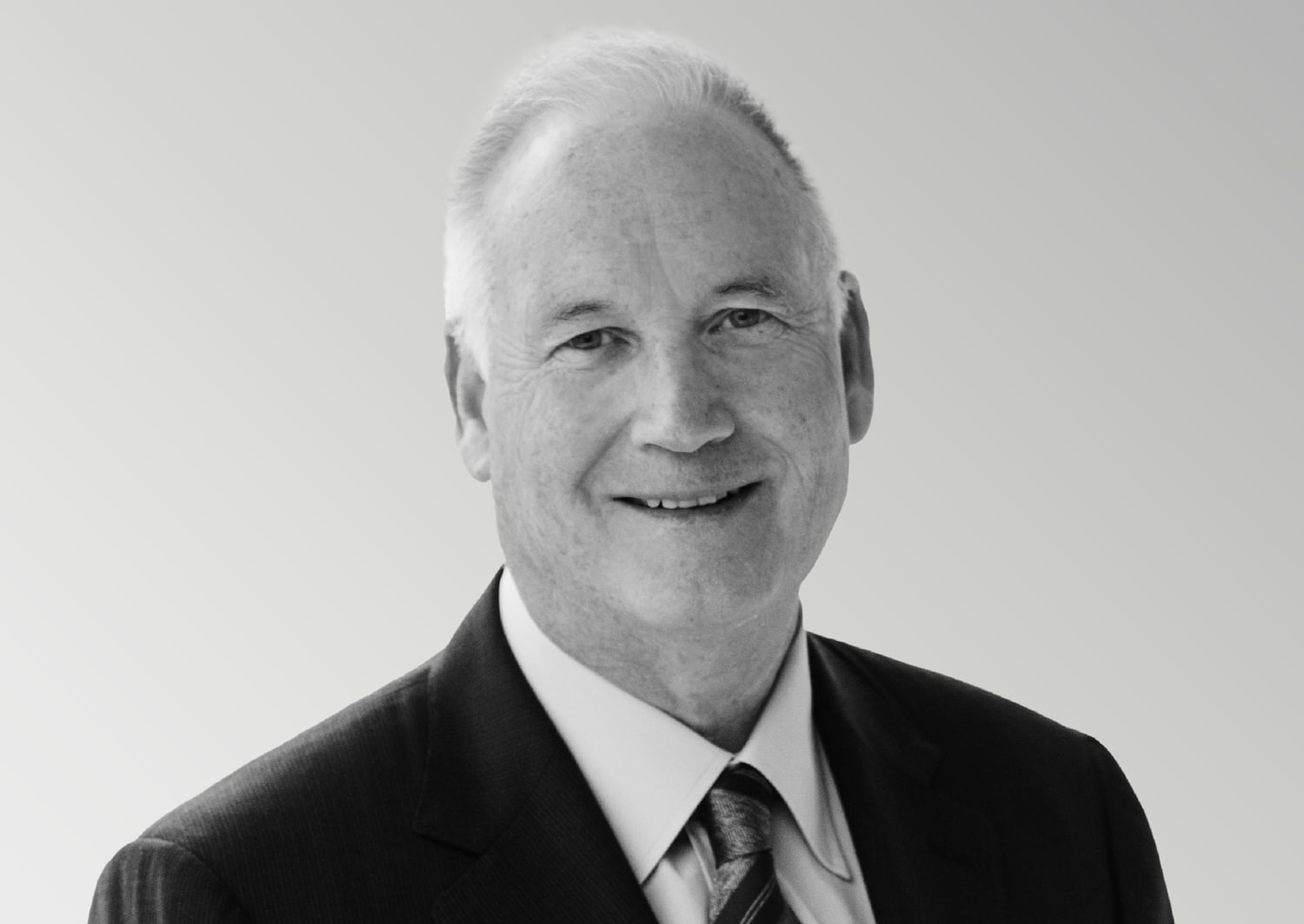Interviewed by Linnéa Jungnelius
Before Erik Anderson became one of Golf Inc.’s Most Powerful People—before Topgolf, TOCA, and WestRiver Group—he was a kid in Spokane, Washington, fascinated with chess.
He discovered the game at six and played constantly with his best friend next door. It was more than a pastime; it became a way of thinking: slow down, study the position, and don’t just plan the next move—understand the whole board.
That mindset still guides him today. As Founder & CEO of WestRiver Group—a thematically driven investment platform that funds and builds companies across the global innovation economy, and Vice Chairman of Topgolf Callaway Brands, Erik has led and scaled some of the most iconic and forward-looking brands in sports, tech, and entertainment.
Under his leadership, Topgolf became a global phenomenon, reimagining how people connect through play. He’s also a recognized visionary at Singularity University, where he helps organizations embrace exponential technologies to tackle complex global challenges.
In this episode, we explore Erik’s bold approach to innovation, his framework for enduring value creation, and the leadership philosophy that fuels exponential growth—with rigor, optionality, and purpose.
Playing to win — without knowing every move
The best chess players don’t need to know every move. They just need to recognize when they’re in a position to win.
That’s how Erik approaches leadership. Instead of chasing certainty or trying to predict every outcome, he focuses on clarity—asking better questions that unlock stronger decisions:
- Is this a winning position?
- Which future gives me the best board to play from?
"You don't win by guessing right. You win by playing well from the position you're in."
This mindset—rooted in valuing leadership over control—is foundational to how Erik operates in environments where conditions change fast and precision matters more than perfection. It’s the lens through which he views strategy, risk, and value creation.
And to consistently apply it? He built a framework.
A framework for enduring value
Erik’s leadership framework didn’t emerge from theory, it emerged from managing a challenging investment situation with a longtime partner. He recognized that even the closest partners can drift without a shared structure for decision-making. The situation highlighted a failure to unbundle the steps of assessing the circumstances, leading to a lack of clarity regarding recommended actions and the associated risks.
That experience resulted a business structure for for decision-making, leadership and communication
Today, he uses a five-part model to help companies and teams align around what matters and scale with intention at WestRiver Group:
- Brand — your promise to the world and your identity
- Execution — what you’re doing today
- Optionality — the things you could do next
- Exponential Engine — your tech or IP that drives scale
- Values — the culture at your core
One of the clearest examples of this framework in action is TOCA—a company that began with a soccer ball machine and is now transforming how people play, train, and connect.
TOCA started as a high-tech soccer training system invented by former U.S. World Cup midfielder Eddie Lewis. When Erik and WestRiver got involved, they saw a bigger opportunity. What really set TOCA apart wasn’t just the hardware—it was the experience: smart targets and obstacle ball tracking.
“We weren’t the machine,” Erik says. “We were the experience.”
Applying the framework, TOCA evolved:
- Brand → Repositioned from machine-maker to joyful, tech-powered experience
- Execution → Scaled the largest network of tech-enabled training centers in North America
- Options → Launched TOCA Social, a first-of-its-kind venue where soccer meets food, drinks, and music
- Exponential Engine → Doubled down on smart targets, proprietary ball tracking, and in-venue tech
- Values → Centered on helping people become their best through fun, repetition, and shared connection
TOCA’s evolution—from machine to movement—shows what’s possible when leadership meets clarity, and vision is backed by structure.
High intention, real execution
Big ideas are easy to pitch. The discipline to bring them to life? That’s what sets great leaders apart.
For Erik, execution is where ambition meets rigor. At Topgolf, that meant 6 a.m. Saturday calls for two years, reviewing metrics, venue-level data, and customer feedback in real time.
At TOCA, that same mindset helped uncover an unexpected insight. When attendance at a new venue dropped for 45 days, the team didn’t write it off as a seasonal dip. They looked closer—and realized it coincided with Ramadan, when many members of the local community were observing the holy month and shifting their routines.
“Completion,” Erik says, “requires deeper thinking than convenience.”
Rather than treat it as an anomaly, the team used the moment to build cultural awareness into their future planning.
For Erik, this is what execution looks like in practice: listen deeply, learn continuously, and build systems that honor the people you serve.
Build brands that matter
What makes a company resilient in the face of rapid change? For Erik, it’s not just operational strength—it’s meaning.
“We’re here to create moments that matter and connect people in meaningful ways," he explains. "It's that sense of purpose that drives shareholder value."
And it's that belief that shapes how he builds brands. At Topgolf, the goal was never just growth—it was creating a place where people connect through play. At TOCA, it’s about helping people be their best, not just getting better at soccer.
And across every venture, the principle is the same: build around what matters to people—not just what the market rewards.
This purpose-orientation isn’t fluffy. It’s strategic. Erik believes the best companies in an exponential era are creators, not competitors. They don’t fight for share of an old category—they invent new ones.
“Creation beats competition,” he says. “Every time.”

Final takeaway
From childhood chess games to scaling billion-dollar brands, Erik Anderson has built a leadership philosophy rooted in clarity, courage, and care. He doesn’t pretend to control the future. He’s built a system to lead through it with conviction.
In his words: “Success is others doing better.”
In an exponential world, that’s how you win the long game.
Defining brilliance with Erik Anderson
 | Purpose is... | passion and insight. |
 | Leadership is... | principle and conviction. |
 | Success is... | others doing better. |
 | Brilliant leaders are... | humble, thoughtful, and courageous. |
 | I perform at my best when... | I'm inspired by the future of others. |
Never miss insights
Stay in the know with our thought leadership
Linnéa's thinking
#BrilliantPeopleAtWork
Gareth Balch: How Fan Data, Audience Growth, and Sports IP Monetization Are Reshaping the Global Sports Industry
Dec 17, 2025

#BrilliantPeopleAtWork
Brian Neider: Managing Partner at Lead Edge Capital on the Strike Zone Strategy Behind $5B of Disciplined Growth
Dec 01, 2025

#BrilliantPeopleAtWork
Dan Migala: Former Legends Co-President & CRO on Turning Creativity into Commercial Wins in Sport
Nov 17, 2025

